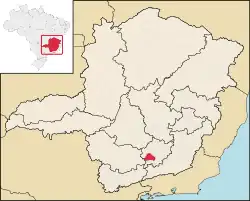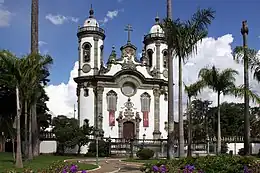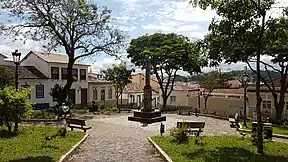São João del-Rei
São João del-Rei[lower-alpha 1] is a Brazilian municipality in the state of Minas Gerais. Founded in 1713 in homage to king John V of Portugal, the city is famed for its historic Portuguese colonial architecture. The current population is estimated at 90,225 inhabitants.[1]
São João del-Rei | |
|---|---|
| Municipality of São João del-Rei | |
 Flag  Seal | |
 Location in Minas Gerais | |
| Coordinates: 21°08′09″S 44°15′36″W | |
| Country | |
| State | |
| Region | Southeast |
| Intermediate Region | Barbacena |
| Immediate Region | São João del-Rei |
| Founded | 8 December 1713 |
| Government | |
| • Mayor | Nivaldo José de Andrade (UNIÃO) |
| Area | |
| • Total | 1,452.002 km2 (560.621 sq mi) |
| Elevation | 904 m (2,966 ft) |
| Population (2022)[2] | |
| • Total | 90,225 |
| • Density | 62/km2 (160/sq mi) |
| Demonym | são-joanense |
| Time zone | UTC−3 (BRT) |
| Postal Code | 36300-000 to 36319-999 |
| Area code | +55 32 |
| HDI (2010) | 0.758 – high[3] |
| Major airport | São João del-Rei Airport |
| Website | saojoaodelrei |
Geography
It is located in the drainage basin of the Rio Grande and its terrain is located in the Mantiqueira mountains. It is a centre for the cities in the south and southeast of Minas Gerais.
The municipality contains part of the Ritápolis National Forest.[4]
According to the modern (2017) geographic classification by Brazil's National Institute of Geography and Statistics (IBGE), the municipality belongs to the Immediate Geographic Region of São João del-Rei, in the Intermediate Geographic Region of Barbacena.[5]
Districts
The municipality has five rural districts.[6]
- Rio das Mortes
- São Gonçalo do Amarante
- São Miguel do Cajuru
- Emboabas
- São Sebastião da Vitória
History
The city was founded by the bandeirantes; Tomé Portes del-Rei is considered the city's founder. The original small village situated in southern Minas Gerais was created as a staging post on the Estrada Real, a trade route from the coast at Paraty to cities in the central region of Minas Gerais such as Ouro Preto, Mariana and Conselheiro Lafaiete. Later huge amounts of gold were found near the city itself.
Culture
Today, São João del-Rei is a university town. The campus of the Federal University of São João del-Rei (UFSJ) and a number of other educational institutions are present in the city. A second medical school is to be established at the University.
The city has many famous religious festivals through the year, most of them preserving the way it was celebrated by the time of the foundation, with baroque music and special celebrations that attracts tourists from all over the world, particularly during Holy Week, when the town receives the greatest influx of visitors.
Tourism
The city is 12 km from Tiradentes. Other historical cities in Minas Gerais are Ouro Preto, Diamantina, Mariana, Congonhas and Sabará.
Cathedrals and churches
- Catedral Basílica Nossa Senhora do Pilar (1721), a Minor Basilica, dedicated to Our Lady of the Pillar, the episcopal seat of the Roman Catholic Diocese of São João del Rei.[7][8]
- Our Lady of Rosário (1720)
- Our Lady of Carmo (1733)
- Our Lady of Mercês e Bonfim (1769)
- São Francisco de Assis (1774)
- Santo Antônio (Senhor dos Montes neighborhood)
- Nossa Senhora da Piedade do Bom Despacho
Sports
The city is home to Athletic Club (1909), an association football team that plays in the First Division of Campeonato Mineiro, along with Cruzeiro, Atlético and América.
Notable people
Folk
- Tiradentes, national hero
Sports
- Thiago Galhardo, association football professional player
Entrepreneur
- Nadir Dias de Figueiredo, glass industrialist
Writers
- Otto Lara Resende, writer (chronicler)
- Bárbara Heliodora, writer and thinker from Inconfidência Mineira
Music
Politicians
Catholic Church
- Blessed Francisca de Paula de Jesus, Afro-Brazilian Catholic laywoman
- Antônio de Almeida Lustosa, Archbishop of Fortaleza, Servant of God
- Lucas Moreira Neves, Catholic cardinal
- Miguel Afonso de Andrade Leite, Catholic priest, Servant of God
- José Maria Xavier, sacred music composer and Catholic priest
Estrada de Ferro Oeste de Minas
São João del-Rei was an important station on the Estrada de Ferro Oeste de Minas, a narrow gauge railway characterised by woodburning steam locomotives, and the location of a major roundhouse. The station and surrounding facilities have been turned into Brazil's largest railway museum, and a tourist railway operates from the station to the well preserved colonial town of Tiradentes.
Notes
- Also spelled São João del Rei or São João del Rey in older references.
References
- "São João del Rei - Informações sobre o município e a prefeitura". www.cidade-brasil.com.br. Retrieved 2023-09-27.
- "IBGE São João del Rei". cidades.ibge.gov.br. Retrieved 2023-09-27.
- "Archived copy" (PDF). United Nations Development Programme (UNDP). Archived from the original (PDF) on July 8, 2014. Retrieved August 1, 2013.
{{cite web}}: CS1 maint: archived copy as title (link) - Unidade de Conservação: Floresta Nacional de Ritápolis (in Portuguese), MMA: Ministério do Meio Ambiente, retrieved 2016-05-19
- "Divisões Regionais do Brasil | IBGE". www.ibge.gov.br. Retrieved 2022-06-24.
- "Dados de distritos de MG". IBGE (Wayback Machine). 2017-08-10. Archived from the original on 2017-08-10. Retrieved 2023-02-24.
- http://www.gcatholic.org/churches/brazil/0936.htm GCatholic, with Google satellite map
- Silveira, Lucas. "Diocese ganha novo mapa territorial após criação de novas foranias". Diocese de São João del Rei. Retrieved 2023-02-19.
External links
- (in Portuguese) Guia Turistico e Histórico de São João Del Rei
- (in Portuguese) Municipal website
- Guia del Rei

.jpg.webp)
.jpg.webp)

.jpg.webp)


